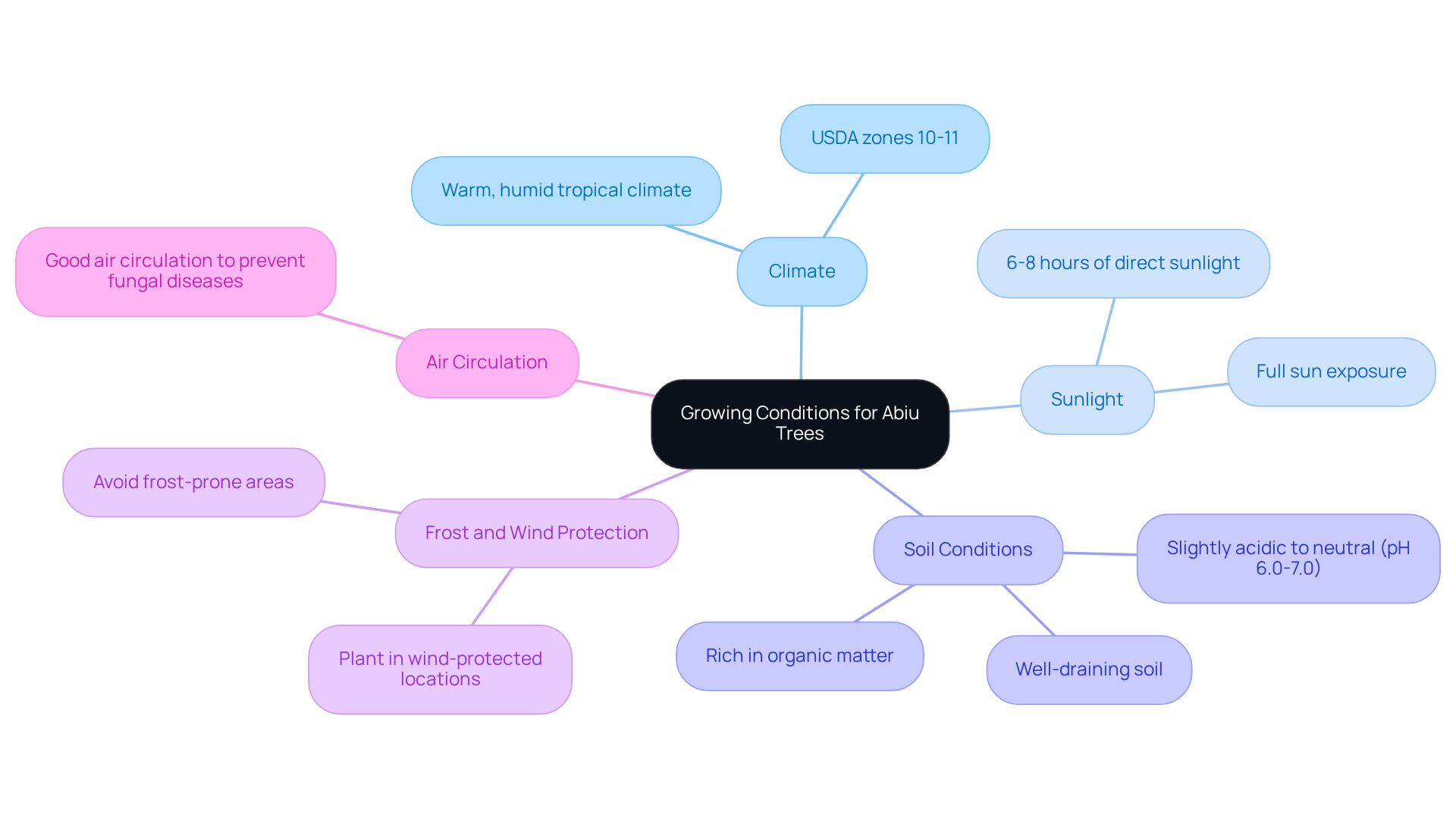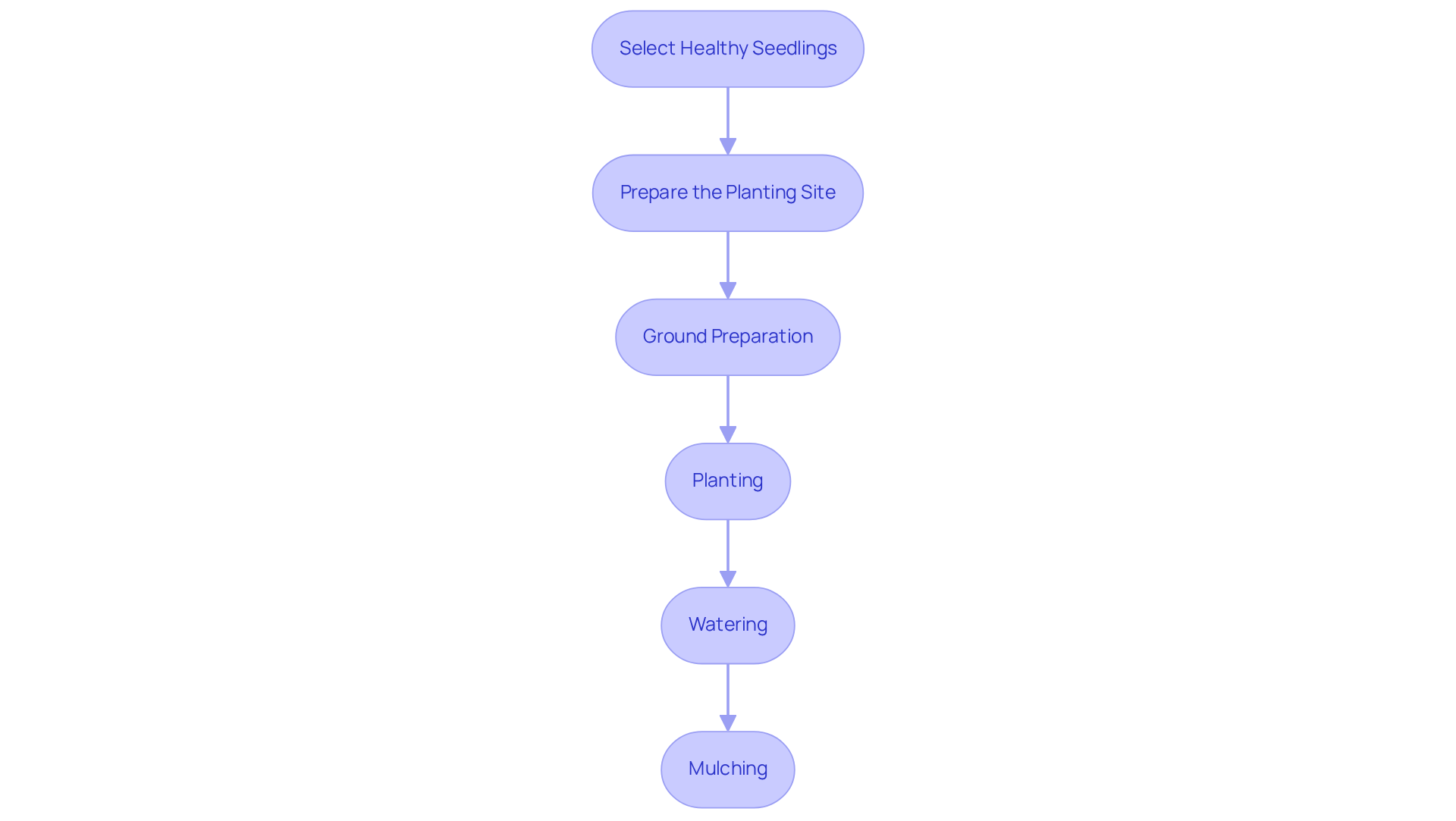Abiu trees, known for their vibrant foliage and delicious fruit, present a unique opportunity for home gardeners eager to infuse a tropical touch into their landscapes. By understanding the essential steps for cultivating these trees, gardeners can embark on a rewarding experience—from selecting the right seedlings to mastering their care and maintenance.
However, the journey of growing abiu trees comes with its challenges. What are the key factors that can determine their success in a home garden? This article will explore these aspects, providing valuable insights for aspiring gardeners.
Want to grow Abiu Trees in your garden?
Explore Abiu Trees for sale at Everglades Farm - shipped directly from Florida.
Understand the Growing Conditions for Abiu Trees
Abiu plants thrive in warm, humid tropical climates, which makes them ideally suited for USDA zones 10-11. As part of Everglades Farm's Fast-Growing Trees collection, these trees present home gardeners with a vibrant and high-yield option for quickly establishing tropical greenery. To achieve optimal growth and fruit production, abiu plants require full sun exposure, needing at least 6-8 hours of direct sunlight each day.
The soil conditions are also crucial; it should be well-draining, slightly acidic to neutral (pH 6.0-7.0), and rich in organic matter. It's important to avoid planting in areas susceptible to frost or strong winds, as these conditions can significantly impact the tree's health. Additionally, ensuring that the planting site has good air circulation is essential to prevent fungal diseases, which are a common concern in humid environments. By following these guidelines, gardeners can successfully cultivate healthy trees of the Abiu variety that flourish in their tropical settings.

Plant Abiu Trees: Step-by-Step Instructions
-
Select Healthy Seedlings: Choose healthy, disease-free seedlings from a reputable nursery. Look for colorful leaves, a sturdy stem, and a thick, well-branched underground system, as these signs indicate good health and vitality.
-
Prepare the Planting Site: Select a sunny location and clear the area of weeds and debris. Dig a hole that is twice as wide and deep as the root ball of the seedling, allowing ample space for root expansion. This preparation is essential for the healthy development of your abiu plant, similar to the methods suggested for soursop and passion crops.
-
Ground Preparation: Combine the excavated earth with organic compost or well-rotted manure to enhance fertility. Ensure the ground is loose and well-draining to encourage the healthy growth of the underground system, which is vital for all tropical fruit trees, including soursop and passion fruit.
-
Planting: Position the seedling in the center of the hole, ensuring that the top of the root ball is level with the surrounding earth and that the collar of the plant is an inch deeper than the new surface. Fill the hole with the prepared earth mixture, gently tamping it down to eliminate air pockets.
-
Watering: Thoroughly irrigate the recently planted sapling to assist in compacting the earth around the base. Maintain the ground evenly damp before and throughout planting, and for the initial weeks to promote root development, as this is a common method for establishing soursop and passion plants.
-
Mulching: Apply a layer of organic mulch, such as bark, peat moss, or straw, around the base of the plant to retain moisture and suppress weeds, keeping it a few inches away from the trunk. This practice benefits all tropical fruit plants, helping to preserve ground vitality and moisture levels.

Maintain and Care for Your Abiu Trees
-
Watering: Abiu plants need consistent moisture, particularly in their first year. Young trees need more frequent watering, approximately two to three times a week, while mature trees can be watered thoroughly once or twice a week, allowing the ground to dry slightly between waterings. It is crucial to avoid waterlogging, as this can lead to root rot. Signs of excessive watering include yellowing foliage and an unpleasant odor, so ensure that the ground is well-draining.
-
Fertilization: To promote optimal growth, apply a balanced, slow-release fertilizer every 2-3 months during the growing season. Granular fertilizers should be utilized three to four times a year for the best results. Incorporating organic compost can further enhance soil fertility, providing essential nutrients that support healthy plant development. Agronomists emphasize that maintaining appropriate nitrogen levels is vital for early development and yield formation, while boron levels are significant during pollination.
-
Pruning: Trim your plant in early spring to remove dead or diseased branches and to shape the Abiu tree. This practice encourages improved air circulation and light penetration, both of which are essential for fruit production and overall plant health.
-
Pest and Disease Management: Regularly inspect your plant for signs of pests such as aphids or scale. If infestations occur, consider using organic insecticides like neem oil. Additionally, monitor for signs of fungal diseases and ensure proper drainage to prevent root rot. Agronomists highlight the importance of monitoring for pests and diseases to maintain plant health.
Troubleshoot Common Issues in Abiu Tree Cultivation
-
Leaf Discoloration: Yellowing leaves may indicate nutrient deficiencies, particularly nitrogen or iron. Conducting a soil test is essential to identify specific deficiencies, allowing for targeted amendments to restore plant health. As horticulturist Jeff Wasielewski emphasizes, implementing sound horticultural practices is crucial for maintaining plant vitality.
-
If your Abiu plant is experiencing poor yield, ensure it receives ample sunlight. Additionally, consider planting a second plant nearby to facilitate cross-pollination, which can significantly enhance yield through abiu. Studies suggest that plants receiving sufficient sunlight and benefiting from cross-pollination can enhance crop yield by as much as 30%.
-
Base Decay: Indicators of wilting or stunted growth may signify base decay, usually resulting from excessive watering. To combat this, check for proper drainage and adjust your watering schedule to prevent excess moisture accumulation. It's crucial to recognize that excessive moisture can lead to root decay, a frequent problem in bearing plants.
-
Pest Infestations: Common pests such as aphids and fruit flies can jeopardize the health of your plant. Regular inspections are crucial; employ organic pest control methods as necessary. For instance, introducing beneficial insects like ladybugs can naturally control aphid populations. Additionally, maintaining a clean area around the tree can help minimize pest populations.
Conclusion
Growing Abiu trees can be a rewarding endeavor for home gardeners seeking to cultivate tropical fruit. By understanding their specific needs—such as climate, soil conditions, and care—gardeners can create an environment where these trees thrive. The essential steps outlined in the article provide a clear roadmap from selecting healthy seedlings to ensuring proper maintenance, allowing for successful cultivation and fruit production.
Key insights emphasize the importance of:
- Warm, humid conditions
- Well-draining soil
- Consistent watering
Additionally, regular fertilization, pruning, and pest management are crucial for maintaining the health of Abiu trees. Addressing common issues like leaf discoloration and pest infestations can further enhance the success of growing these vibrant trees.
Ultimately, cultivating Abiu trees is not just about planting; it’s about fostering a thriving ecosystem in your garden. By following the guidelines provided, home gardeners can enjoy the fruits of their labor while contributing to biodiversity. Embrace the journey of growing Abiu trees and watch as they flourish, bringing both beauty and delicious fruit to your home garden.
Transform Your Garden with Abiu Trees Today!
Start your tropical gardening journey with Everglades Farm and enjoy delicious fruits in your own backyard.
Frequently Asked Questions
What climate conditions are ideal for growing Abiu trees?
Abiu trees thrive in warm, humid tropical climates, making them suitable for USDA zones 10-11.
How much sunlight do Abiu plants need for optimal growth?
Abiu plants require full sun exposure, needing at least 6-8 hours of direct sunlight each day.
What are the soil requirements for Abiu trees?
The soil should be well-draining, slightly acidic to neutral (pH 6.0-7.0), and rich in organic matter.
What environmental conditions should be avoided when planting Abiu trees?
It is important to avoid planting in areas susceptible to frost or strong winds, as these conditions can negatively impact the tree's health.
Why is good air circulation important for Abiu trees?
Good air circulation is essential to prevent fungal diseases, which are a common concern in humid environments where Abiu trees grow.





0 comments